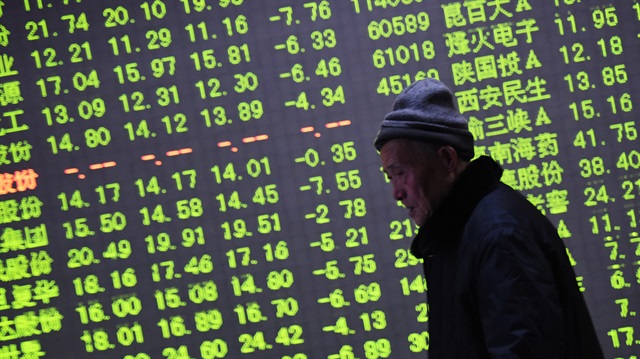
China's stock markets ended higher on Thursday, as investors looked past new tariffs Washington and Beijing slapped on each other's goods in the latest escalation of the trade war between the world's two largest economies.
The Shanghai Composite index ended 0.4 percent higher. The country's blue-chip index also gained 0.4 percent.
Both indexes had traded lower in the morning session, but turned higher after the new tariffs were officially implemented at 0401 GMT on Thursday.
The United States and China enacted 25 percent tariffs on $16 billion worth of the other's goods, following through on threats made earlier this month.
While the immediate market reaction to the tariffs taking effect on Thursday was muted, investors and analysts will look to see how the increased trade barriers impact corporate earnings in months ahead.
"The tariffs were fully expected by the market. But the future of the discussions and how the U.S. and China will play the game remain great unknowns at the moment," said Zhang Gang, an analyst at Central China Securities in Shanghai.
"The correction in A-shares over the past few days has already basically reflected the negative factors pulling down the market," he said.
Trade volumes were relatively light, with about 9.84 billion shares traded on the Shanghai exchange, roughly 72.6 percent of the market's 30-day moving average of 13.57 billion shares a day.
The new tariffs on U.S. and Chinese goods bring to $100 billion the combined value of both country's products hit by tariffs since early July, and threaten to deepen the risks to global growth posed by the Sino-U.S. trade war.
The smaller Shenzhen index ended up 0.6 percent and the start-up board ChiNext Composite index was higher by 1.1 percent.
So far this year, the Shanghai and CSI300 stock indexes have both fallen 17.6 percent, making them the world's worst-performing major indexes. Shanghai stocks have declined 5.1 percent this month.
Among the day's winners was Ping An Insurance Group Co of China, which extended a rally this week to end 2 percent higher. The company on Tuesday reported its largest half-yearly profit in at least a decade.
The rise in Ping An shares helped to lift financial sector sub-index, which gained 0.5 percent.
Consumer and healthcare firms, which have been battered in recent weeks by a confidence-sapping vaccine scandal, also rebounded, with the consumer staples sector up 0.4 percent and the healthcare sub-index up 0.8 percent.
But real estate shares fell 1.3 percent amid a cloudy outlook for the sector.
Some developers also weighed in Hong Kong, where the Hang Seng index was down 0.6 percent at 0735 GMT. The China Enterprises index was off by 0.5 percent.
Developer Sino-Ocean hit a one-year low after the company said its first-half profits fell 12.7 percent from a year earlier. Index component China Resources Land was 2.8 percent lower.
Also pulling down shares in Hong Kong was Li & Fung Ltd , which fell to a six-week low after it posted sharply lower first-half profits and forecast a challenging environment for retailers.
China Overseas Land gained 1.7 percent after announcing a 7.2 percent rise in first-half profits, despite the company noting "abortive land auctions" in many cities in China in the first half.
Currency markets were unfazed by the imposition of new tariffs, with market observers noting that the impact of the tariffs on China's yuan had long been priced in.
The currency's fall on Thursday reflected instead a rebound in the U.S. dollar in overseas markets, with the People's Bank of China setting the midpoint of the yuan's daily trading band at 6.8367 per dollar on Thursday, 96 pips weaker than Wednesday's fixing.
At 0735 GMT, the spot yuan was trading at 6.8712 per dollar, 324 pips weaker than the previous day's close.










